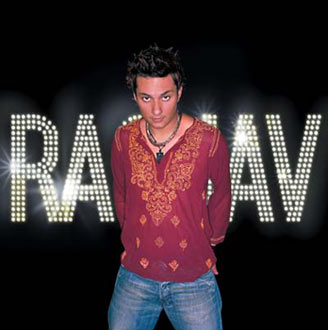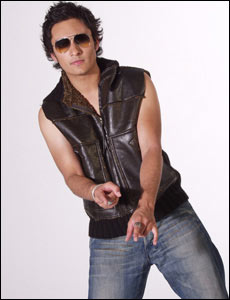
Raghav

Raghav
With people such as Deeyah and Jay Sean breaking through and various unsigned acts snapping at their heals, 2005 will see a host of new Asian talent bring a fresh flavour. At the top of his game is Raghav who scored top 10 hits in 2004 with "So Confused" and "Can't Get Enough". It's "Angel Eyes" which looks set to be his biggest hit to date and prior to his appearance at the Cardiff Millennium Stadium charity gig for the Tsunami victims, Designer Magazine editor Alex McCann caught up with Raghav to chart his path to international success
Q: You started to get involved in music at such an
early age. When people start this early it's usually the tradition that
they're following a grand musical family heritage. Was that the case?
Q: No one in my family is musical, in the sense that
they perform or anything, but music it always was a very important part
of our household. It was played all the time so I was encouraged to listen
to music and eventually it translated into wanting to perform it. And in
Indian culture, especially in my family, everyone knew all the songs and
films, they were very clued up on the indian side. From a very early age
I had access to all that information.
Q: You started performing initially in Canada and there's
a lot of cultural identity going on there (For example Indian-Canadian
or French-Canadian). How important was the cultural mix on your upbringing?
A: Very important. The diversity of Canadian culture
is something that I grew up respecting big time. In schools it's something
we were always taught about and it was kind of always encouraged to be
different. Having said that we didn't have the indian community we have
over here with East Indian, Asian and Pakistani communities. It's more
visually apparent that they're part of the mainstream society just cos
there's lots of us over there (in Canada).
I always grew up with, and this goes down more to family
than actually Canada itself, fiercely proud to be indian. But at the same
time it wasn't until I came to England that I really discovered that good
balance between my indian music side and my more western upbringing.
Q: What was the first song that really made an impact
on you?
A: We had a tape deck in our Ford Granada back in the
early 80s and all our family was over from India. Everyone could do something,
and this was when I was 5, and there was a song from an Indian film by
an actor called David Ardu. This song got stuck in our tape deck and kept
playing over and over and over again. With our family it was like "What
can Raghav do? Can he do anything?". My mum's like "He's only 5. He doesn't
really do anything". So I took deep offence to that and started singing
the song from beginning to end...and that was kind of the first song that
made me think i'm gonna stick with this.
Q: And from that one brief moment you started taking
seriously and ended up in various music schools across America.
A: Yeah. When I was in High School I had a great High
School music teacher who taught me that a career in the performing arts
was very viable. The only kind of ruck that you have in Calgary is it's
a big city, but still has a town mentality. So the problem then was if
you wanted to follow a career how do you then go and do it, cos I didn't
have the benefit of growing up in New York with a ton of producers and
artists around you. And then of course I picked R&B and indian music
and those were probably two of the least accessible aspects of music that
you'll find in Calgary, Canada.
So I went to LA and the thing about music schools is they
allow you to be surrounded by other musicians. At the same time if you
just stay within that boundary it's tough to get out of it.
Q: Knowing that he'd worked with legends such as Michael
Jackson and Madonna, how was it working with Seth Riggs?
A: Seth was great, I don't know whether you've met him
or seen any documentaries about him, but he's an eccentric character. On
any given day you'd be in the rest room and Stevie Wonder or Natalie Cole
could be on the phone. I was just this geeky nerdy 17 year old Indian-Canadian
kid with no concept of any of this stuff other than owning the albums.
He really took me under his wing and could have easily dismissed me as
someone who didn't have a chance. But he didn't dismiss me and in retrospect
that was crucial to me believing in myself.
Q: In indian music there's a crucial difference between
that and western music in the fact that the musical scales are different.
How did you bridge the gaps vocally?
A: I used them to my advantage. For every 8 notes on
the western scale we have 64 indian notes. When I started singing music
it was Hindi music and so some of those notes naturally came to me when
I was younger. I was in musicals in junior high and people would say "You
sound weird, you sound like you're singing in a different key. It sounds
good, but it's not the right key" and it's very difficult to quantize that.
When I started song writing I realized that if I don't think about and
I just sing whatever sounds right to me - it comes out sounding a little
bit different I hope.

Q: When did you actually move from singing to song
writing?
A: About 14 or 15. In Calgary we grew up around a lot
of country music. I was a big fan of country music in my teenage years,
which made me even weirder. Here I was of Indian origin and I loved country
music - it was like what's wrong with you. The reason I loved country music
is, that although I love R&B and hip-hop, country music always had
a story and I could connect to them. There's the stereotypical I lost my
wife, I lost my truck kinda stuff but some of the stories with them are
the reason why people like Ronan use them as pop songs now.
I thought I want to write songs with stories. I don't
just want to write "hey gal, you got a nice booty", that kinda stuff's
cool too. I write stuff like that as well, but I like songs that have a
story with a beginning, middle and end because if people get sick of the
music, rhythm or the voice they can't get sick of the story and the lyric.
Q: On the album the songs are stories and have a bit
of a twist that you wouldn't have on your typical R&B track. Is it
quite hard to come into a saturated genre and put your own stamp on things?
A: I think if you tried to do that it would be very hard,
but I think if you just remain totally true to who you are and don't go
into a studio and go "How can I come across really urban? Or how can I
come across really indian? Should I put a hindi lyric in there?" If you
try to that, which I have done in the past, the songs sound really contrived.
Q: You've got a couple of tracks with Sly & Robbie,
but most of the album is co-written and produced by Mushtaq (Damage, Misteeq
etc.). How did you go about choosing the producers?
A: Mushtaq's got about 5 tracks on the album and Sly
& Robbie are actually on about 5 or 6 tracks. I've been with my manager
for 4 years and he goes "I think I have the best people available in the
world, in reggae music and jazz. And you sit down with them and if they
respect what you do write some stuff together". We did and that's the bi-product
of some of the stuff on the album. I feel that artists have their one producer
that they feel very much at home with: Michael had his Quincy, Stevie Wonder
has Stevie Wonder cos he does everything himself...and I have definitely
feel like I have my Mush.
Q: I've read in a lot of reviews that there was a battle
between creating a pop album and your album. A lot of people who preferred
the two bonus tracks on the album didn't like the rest of the album and
vice versa.
A: Critics and people have the right to think whatever
they want and that's why you put certain tracks on an album. If they sit
back and look at the mentality of how the album was made, it wasn't like
we just tried to put a bunch of different ingredients together. The one
thing that makes sense from the 2 Hindi tracks all the way to "So Confused"
and "Can't Get Enough" is they're all songs written with a purpose in mind.
I feel strongly that in different markets all the tracks on there are potential
singles. It was a case of how do I define myself as an artist over 16 tracks...and
it took 16 tracks to do it. If you look at other albums out it's pushing
the envelope a little in that it's got 16 songs on there. But I feel that
in order to get myself across as a total artists I needed to do that. If
I did 16 tracks just like the last 2 you'd only be seeing one aspect of
me and I don't think that's right.
Q: And then "Ain't Nobody" comes in right at the middle
as a straight up soul track and is something again you don't expect
A: Thank you. It went through our mind that it really
breaks up the album. "Ain't Nobody", even more than the Hindi songs, is
the most indian song on the album because the scales are very indian, the
beats are indian, but I don't want people to think about it. I just want
people to think this is a banging R&B track.
Q: And I guess going back to working with Seth and
the people he's worked with - you've got a real commercial head on you.
You know what tracks will work on the radio
A: I hope so. Radio play, especially in the UK, is so
important in maintaining a career. "Angel Eyes" is the catchiest ditty
on the album. The fact that it's on the "Murder She Wrote" rhythm, which
is probably the most standard biggest reggae rhythm of all time. Simultaneously
I don't want it to just get onto the radio - I want it to get into people's
hearts and soul. I hope people will listen to these tracks in 5 years time.
***********
The single "Angel Eyes" is out on February 7th
The album "Storyteller" is out now
For more info
www.raghav.com
***********
*****************
Click
here to leave your Raghav comments on the Message Board
(NB: The message board opens in a new window so
please disable your pop-up blocker to view)
*****************